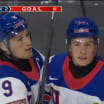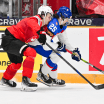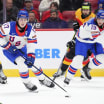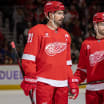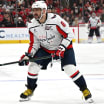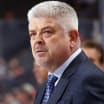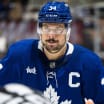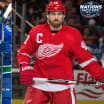Allvin wants to see Canucks continue to improve in long term
New GM discusses working under Rutherford, Trade Deadline strategy in Q&A with NHL.com
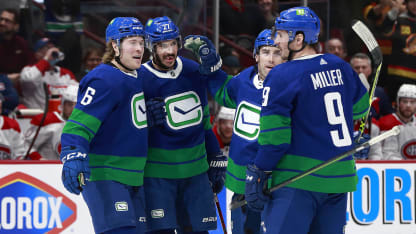
© Jeff Vinnick/Getty Images
And yet, in 10 days, Allvin will undergo his first major test, with the 2022 NHL Trade Deadline on March 21 at 3 p.m. ET.
"I'm still working my way through here," Allvin said Thursday from a conference room in Rogers Arena. "I've seen the faces, maybe I don't know the names. But we're getting there."
So is his team.
Entering Friday, the Canucks (29-23-6) had won three straight and eight of 10 to put themselves back into the race for the Stanley Cup Playoffs; they were in fifth place in the Pacific Division, three points behind the Dallas Stars for the second wild card into the playoffs from the Western Conference and four behind the Nashville Predators for the first wild card. Vancouver was four points back of the Vegas Golden Knights for third in the Pacific heading into its home game against the Washington Capitals.
When Allvin was hired by the Canucks on Jan. 26, they were 18-19-5 and seventh in the eight-team Pacific; when predecessor Jim Benning and coach Travis Green were fired on Dec. 5, Vancouver was 9-15-2 and last in the division.
So does that change the calculation at all for Allvin?
"I think every team says they want to be in the playoffs," Allvin said. "We want to win the Cup, but I think somehow you've got to be realistic. I guess you could be hot one year and win a Cup. I don't know what your odds are. I mean, we've got a tremendous goalie (Thatcher Demko, who was 26-16-2 with a 2.64 goals-against average, .917 save percentage and one shutout in 46 games this season).
"But I think my picture is, like how do you get good over years? What do we need to do to be competitive and really good over a long period of time? I think that's where I want to be."
Allvin spent the past 16 seasons with the Pittsburgh Penguins, most recently as assistant general manager, where he helped them win the Stanley Cup three times (2009, 2016, 2017). He said he's taking guidance from his time with Pittsburgh to determine which moves he makes next, to build a team that has staying power.
"I don't want to be a team that hit in the (NHL) Draft one year and misses in the draft next year. I don't want to be a team that makes a playoff one year, misses a playoff [the next]," Allvin said. "But I think that's been part of Pittsburgh for 15, 16 years. We were always talking about, 'How do we get better?' Like, how do we get better all the time? Because other teams want to chase us. So things we did two years ago are not necessarily the things we're going to do moving forward. But really, we need to be open-minded, we need to be better all the time."
Allvin spoke to NHL.com about learning on the fly, the short-and-long term plans for the Canucks, and the status of center J.T. Miller, who can become an unrestricted free agent after next season.
What is the approach with 10 days until the trade deadline?
"Every day feels like a year, right? The good thing is we don't really need to do anything. We control our players moving forward. I think we have two UFAs in (goalie Jaroslav) Halak and (forward Tyler) Motte, so we still have time here."
The word is that it's been quiet so far around the NHL. Is that your experience?
"Yeah, it's been fairly quiet, I've got to say. But I guess teams respect that we're still in the playoff hunt, that we're not out. I don't know where they are. But maybe a little bit surprised it's been this quiet. Sounds like that's been the case across the League."
What was the impact of being part of those Pittsburgh Penguins teams? What impact does that have on what you're doing here in the short and long term?
"Definitely a big impact. And I think sometimes you take it for granted, when you have a player like (center) Sidney Crosby, you don't realize how exceptional he is, and what it means to the whole franchise of having the perfect player. I would assume the Sedins (Daniel and Henrik) were probably like that for this organization, too, where you take things for granted. I think those are exceptional, how they prepare themselves every day and how they create that culture, that environment that is contagious, that everybody wants to be that."
When you are new to an organization and still settling in, how much harder does that make the decisions at the trade deadline?
"That's a good question. I think, honestly, to be here with Jim Rutherford (hired as Canucks president of hockey operations Dec. 9) and his knowledge, he was here a month and a half before I got hired, he got a little bit better handle on things. Every day, to ask Jim questions and go through different scenarios, I think I'm very, very fortunate to have him. To be honest, I think that was probably the biggest reason that I thought that this would be a great fit for myself starting as a first-year GM and having a mentor like Jim and the precedent here, and all that. It was a seamless transition into it. I know what Jim wants and I know what kind of standard and what he kind of stands for. So it was easier for me to come in here for sure."
J.T. Miller has been the subject for the bulk of the talk around the Canucks and the trade deadline, though he is signed for next season. He said yesterday he expects to stay in Vancouver. Where do things stand with him?
"We have J.T. Miller for another year and as I said, I think he's been the best player since I got here (67 points; 23 goals, 44 assists in 56 games to lead the Canucks in scoring). I have a lot of respect for him and the way he plays. So that's where that stands. I don't think we need to do anything."
Is there a hope that the relationship lasts beyond next season?
"I hope so. I definitely hope so. But again, I haven't really talked to him or his agent."
What is this team's biggest need?
"I think if you're going to be a successful team over time, you need the home-grown young players. And I think that's something to emphasize on, bringing in good young players in the pipeline and kind of develop them and work with them down in Abbotsford (of the American Hockey League). So I think that's a big need for us."
Has this all been hard to figure all this out midseason?
It is, it definitely is. Billy Guerin, a friend of mine, similar [when] he took over in Minnesota (with the Wild) there. I think it was late August, but it was like you didn't plan much. So I'm talking to him a lot, and his approach of just observing and taking it in and learning and all that. So he's been a great guy to talk to."
Have those relationships helped with the phone calls?
"It definitely has. Both yes and no. I'm very fortunate. Chuck Fletcher in Philly (with the Philadelphia Flyers), Don Waddell in Carolina (with the Hurricanes), Billy in Minnesota and Tommy Fitzgerald in New Jersey (with the Devils) and Pierre Dorion in Ottawa (with the Senators), too. So five that I worked with. So obviously that's great to have that relationship."
You already have those numbers. But don't they already know your negotiation tricks?
"Exactly. That's good and bad, good and bad."


